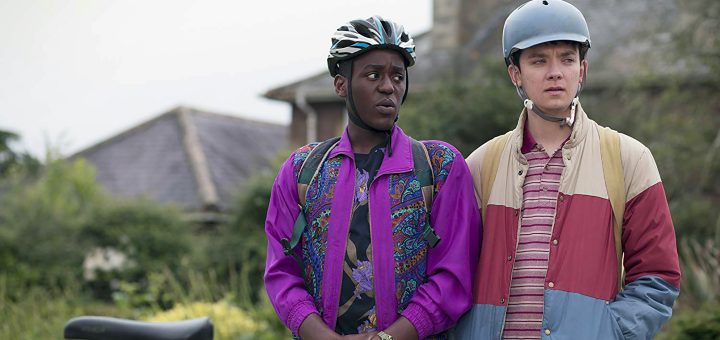‘This is my dick’: How Sex Education helps you own your narrative on Valentine’s Day

By Riggs Zyrille Vergara, Contributor
Let’s face it, aside from romantic dates in high-end, dimly-lit restaurants paired with large bouquets of roses and heart-shaped boxes of chocolates, another thing everyone will be focusing on this Valentine’s Day is sex — a lot of sex.
Before love month, Netflix timely released one of the most-talked about series today — Sex Education. Aside from making an honest and unromantic, yet sensitive and humor-filled take on the wonders of teenage sex, it teaches us that in order to love others, we must first learn to accept ourselves. So, whether you’re going to have a lot of sex or no sex at all, going through this raunchy dramedy series is a good way to start your Valentine’s Day.
Each character will captivate you on how they faced their struggles with family, friendship and romance. They each went through unique journeys to find solace with their identities and inevitably, own their narratives.
Starring in the series is former child-star Asa Butterfield, multi-award winning actress Gillian Anderson and breakout stars such as Ncuti Gatwa and Emma Mackey. It takes on the wild concept of an awkward virgin teenager, Otis Milburn (played by Butterfield), who ends up becoming Moordale High’s unofficial sex therapist due to his wealthy knowledge about sex from his sex-therapist mother, Jean Milburn (played by Anderson).

In Sex Education, Otis Milburn (left) takes after his mother (right) and becomes his high school’s unof cial sex therapist. Photo courtesy of Netflix
It doesn’t happen overnight
One of the first main characters introduced was Adam Groff, played by Connor Swindells. Adam is the headmaster’s son and was branded as the guy with the “big elephant cock”. The first episode concludes with him flashing his penis in front of the school cafeteria as his way of following Otis’ advice to “own your narrative, not let it control you. Be proud of your penis and your heritage.” This is after he gulped down three tablets of Viagra because he thought it could help him in his trouble reaching orgasm. As it turned out, he got an overwhelming erection that lasted for hours. It was only until Otis and Maeve Wiley, played by Mackey, overheard his moaning and helped him that he calmed down.
This episode shows the series’ unique way of fixing the characters’ sexual problems — letting them own their narrative. What Adam’s story excellently portrays is that “owning your narrative” doesn’t happen overnight. He thought he could solve his problems by literally showing himself to the world. But after he finally reaches orgasm with Aimee, she broke up with him. He was scolded by his father which made their relationship worse. Throughout the series, Adam goes through strife while navigating his identity in terms of his fear of his father, his homophobia and his sexuality. Until the last episode, Adam’s journey towards his “narrative” is still unclear. But one thing’s for sure — he is on his way.
Fabulously owning it
Another stand-out character is Eric Effiong, Otis’ black gay best friend, who is played by Gatwa, but he’s not your usual stock character. His struggle started when he got beat up by drunk homophobes while he was all glammed up as Hedwig Robinson, a transgender singer, from a stage musical called Hedwig and the Angry Inch. He was supposed to attend the musical with Otis as a yearly tradition for Eric’s birthday, but Otis was with Maeve. To make matters worse, Eric was unable to control his anger when one of the usual bullies mocked him at school. He punched the guy.
Now Eric might have spiraled down from that incident, but as stated, he was different. He had an epiphanic moment when an African-American man in jewel blue nails and eyeshadow asked him for directions. By seeing there was someone like him out there, Eric was motivated to accept his identity. He attended church with his family for the first time in years.
“You are welcome here anytime. This is your family,” the priest told him.
Later that night, Eric went to the school dance in gleaming glitter makeup, a Ghanaian kente suit and a Nigerian head tie. While dropping him off, Eric’s dad got worried with his son’s look and asked, “Why do you have to be so much? I don’t want you to be hurt.” To which Eric answered, “This is me. I’ll be hurt either way. Isn’t it better to be who I am?”
It might’ve caused him a lot of struggle and pain, but Eric fabulously owned his narrative. Instead of succumbing to the frustration and fear, he used what was the source of his hate crime and made beautiful memories with it. He recognized that he had to embrace everything about himself — sexuality, religion and family — in order to recover and truly own his narrative.
Self-compassion
It has been a long-known concept that in order to love others, we must need to love ourselves first. But Dr. Kristin Neff, a psychology professor from University of Texas, discovered there was something more to self-love that is needed in romantic relationships — self-compassion.
She pioneered the research on self-compassion which involves viewing your flaws, failures and mistakes with kindness and acceptance.
On her website she explains, “Instead of ignoring your pain with a ‘stiff upper lip’ mentality, you stop to tell yourself ‘This is really difficult right now. How can I comfort and care for myself in this moment?’”
Her studies found out that more self-compassionate people are more caring and supportive and less verbally aggressive or controlling in relationships, which in turn lead to reported higher levels of overall relationship well-being.
This Valentine’s Day, many of us might be pressured to fulfill the societal norm of having a date or having to make a grandiose act of love for someone. But Sex Education’s characters are telling us that we don’t need to immediately do anything for the sake of self-improvement if we’re not comfortable with it yet. They’re telling us it’s okay to stay where we are for a while. It’s okay to be proud of something that might not be considered a conventionally pretty part of yourself — may it be your sexuality, religion, beliefs, kinks or marital status. It’s okay.
There will always be parts of ourselves we want to improve on. There’s no such thing as perfect self-love or a perfect narrative. But the day we treat ourselves with the kindness we deserve is the day we will become ready for far more complicated ventures in our lives that will eventually lead to that narrative we are aiming for.



